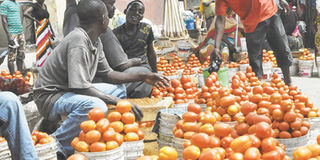Glut reduces tomato prices by 88pc

Tomato traders wait for customers at the Urafiki Market in Dar es Salaam.PHOTO|FILE
What you need to know:
- Currently, a tomato oversupply has depressed prices to uneconomic levels.
- “Five years ago I enjoyed high tomato sales, got a substantial amount of money and sent my children to good school. This season, prices tumbled and my capital has been wiped out. It is difficult to sustain my family members of seven,” laments Mr Jonas Malta, a resident of Mlali Village in Mvomero District, Morogoro Region.
Dar es Salaam. Tomato farmers will benefit from their produce if more agro-industries are built and more markets are found.
Currently, a tomato oversupply has depressed prices to uneconomic levels.
“Five years ago I enjoyed high tomato sales, got a substantial amount of money and sent my children to good school. This season, prices tumbled and my capital has been wiped out. It is difficult to sustain my family members of seven,” laments Mr Jonas Malta, a resident of Mlali Village in Mvomero District, Morogoro Region.
After realising that tomato prices were high last season, a large number of small-scale farmers grew the crop this season. This has led to the tomato oversupply, depressing prices.
According to him, the price of one crate of tomatoes last season was Sh60,000. But this season it has fallen to between Sh7,000 and Sh8,000.
That has been the trend the situation in other parts of the country.
Ms Zubeda Mboya, of Kilimanjaro Region, was quoted as tomato farmers had suffered a lot. An agribusiness consultant, Mr Ebron Mwakalinga, says creating a conducive environment for promoting agro-industries to add value to tomatoes for local consumption and exports will enable farmers to gain.
“There is a great need to build national capacity for tomato growers to enjoy high prices in all seasons. We have in place the Horticultural Development Council of Tanzania, but it is unable to stabilise the market.”
He also talks about the need to explore ways of finding foreign markets for processed tomatoes. “China is the major exporter of tomato paste. China’s exports of tomato paste account for more than 70 per cent of global market.” Tanzania Horticultural Association chief executive officer Jacquiline Mkindi would like tomato production and processing to be increased and find reliable markets – local and foreign.
Ms Mkindi says since the crop is seasonal and depends on rainfall and traditional practices, capacity is low to meet demand throughout the time. “Farmers increase supply on a seasonal basis. During this period, prices fall because supply is high. When the season ends, tomatoes become scarce.
Factories such as Lulu Tomato based at Mlandizi and Darshi have been complaining about poor off-season supplies.”
According to her, there is a need to build capacity through strong partnership between private and public sectors as well as creating an attractive investment environment for investors to set up more factories.
The permanent secretary in the Ministry of Industry, Trade and Investment, Prof Adolf Mkenda, told BusinessWeek that the government was mobilising investors to establish more tomato processing factories.




